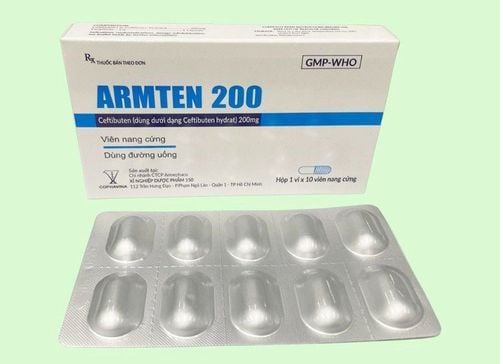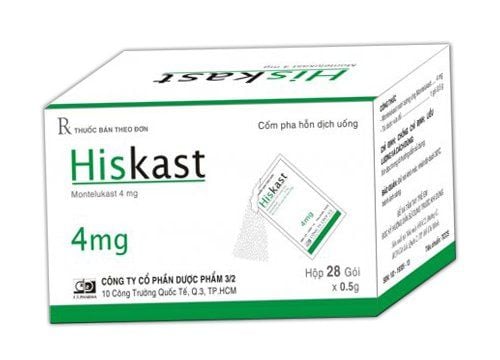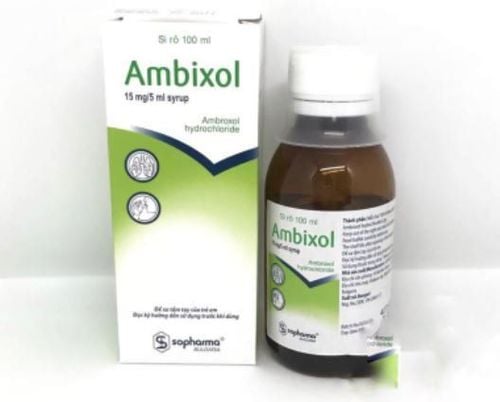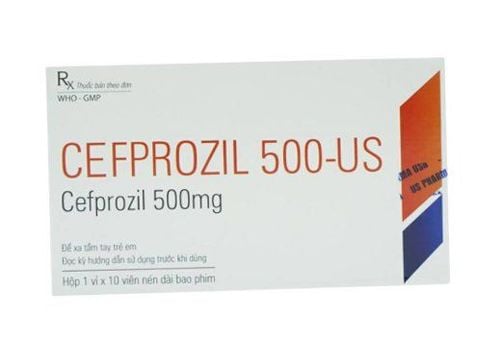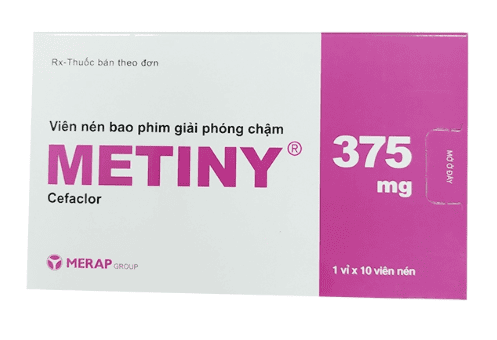This is an automatically translated article.
Bronchitis is a common disease of the airways and can cause lung obstruction. There are many medications to treat bronchitis, including antibiotics. When using antibiotics to treat bronchitis, patients should absolutely follow the doctor's instructions.1. What is bronchitis?
The bronchi are a system of many branches, from large to small, that carry air into the lungs. In which, the two largest branches are the left and right main bronchus. When the bronchi are inflamed, it will damage the cell layer covering the bronchial tubes, edematous submucous tissues, causing contraction of smooth muscles under the tissue layer, secretion of fluid into the bronchial lumen, leading to symptoms. cough, wheezing, phlegm,...Acute bronchitis is mainly caused by bacteria and viruses. The disease is transmitted through the respiratory tract through droplets of secretions (nasal drip, sputum, ...) when an infected person coughs, sneezes, or is inhaled or touched by others. The disease is common in winter - spring, when the weather conditions are suitable for the virus to cause disease.
Symptoms of acute bronchitis include:
Cough: Dry cough or cough with sputum, cough with attacks or cough every hour, cough usually appears in the evening,...; Fever: High fever or low fever, even without fever, fever intermittently or continuously; Runny nose, stuffy nose; Sputum: Green, yellow or white in color, with an unpleasant odor; Wheezing: Due to narrowing of the bronchial lumen due to edema of the bronchial walls, sputum in the bronchial lumen, bronchial smooth muscle spasm,...; Other symptoms: Rapid breathing, difficulty breathing, pale skin, nausea and vomiting, loss of appetite or loss of appetite, rapid weight loss, etc. The doctor will diagnose the disease based on the above clinical symptoms. In addition, the doctor can also give the patient a number of blood tests, CRP, bronchoscopy, chest X-ray, ... to make accurate diagnostic conclusions.

Xét nghiệm máu giúp chẩn đoán bệnh viêm phế quản
2. Treatment of bronchitis
2.1 Antibiotic therapy
Over 90% of bronchitis cases are caused by viruses. Therefore, in many cases, patients with internal bronchitis need antibiotic treatment.Antibiotics for bronchitis are only used when:
There are signs that the cause of the disease is bacteria. Signs include: Bad general condition, expectoration of green, yellow or purulent sputum, prolonged fever, the disease does not improve after 10 days,...; Cases of acute bronchitis in patients with heart, lung, liver, kidney disease, immunodeficiency, neuromuscular disease,...; The patient is over 65 years old, has an acute cough, accompanied by 2 or more of the following: Hospitalized in the previous 1 year, has diabetes, has a history of congestive heart failure, is currently taking oral corticosteroids. The antibiotics used include: ampicillin, penicillin, amoxicillin, beta lactam, macrolide, quinolone,... Depending on the severity of the infection, the doctor will prescribe the patient antibiotics for bronchitis. difference. Patients should not arbitrarily buy drugs, adjust the dose or suddenly stop taking the drug because it can cause antibiotic resistance or drug poisoning.

Thuốc kháng sinh sử dụng điều trị viêm phế quản cần tuân theo chỉ định của bác sĩ
Choose antibiotics of the macrolide group or doxycycline for patients with acute bronchitis who were previously completely healthy; Choose a quinolone antibiotic or a beta-lactam antibiotic in combination with a beta-lactamase inhibitor for people with acute bronchitis with a history of antibiotic use in the last 3 months or elderly patients with acute bronchitis with chronic diseases. accompanying nature; Patients with acute bronchitis caused by Mycoplasma pneumoniae or Chlamydophila pneumoniae: All sensitive to macrolides, tetracyclines and fluoroquinolones; Patients with acute bronchitis caused by Influenza virus: There is no specific treatment, in severe cases, neuraminidase inhibitors such as oseltamivir or zanamivir can be used. For optimal treatment effect, antibiotics should be used to treat bronchitis within 48 hours of symptom onset. The duration of antibiotic treatment is 7-10 days.
MORE: What to do if a child has diarrhea when taking antibiotics for bronchitis?
2.2 Treatment of bronchitis symptoms
Treat the symptoms of bronchitis as follows:
Fever: Use antipyretics acetaminophen and ibuprofen. With ibuprofen, use it only when directed by your doctor. Use antipyretics only when the fever is above 38.5°C. For children with cardiopulmonary or neurological diseases, it is necessary to consult a doctor before taking the drug. Absolutely do not use aspirin to reduce fever for children, peptic ulcer patients or asthmatics. Fever-reducing cooling is also not routinely recommended; Cough: When a lot of cough leads to insomnia, vomiting, ... the patient should drink a lot of water to improve coughing and expectoration. An expectorant may be used in case of thick sputum or difficulty in expectoration. Patients should not take cough suppressants because they reduce the secretion of sputum, slowing down the recovery of the disease. In case of optimal treatment, but the patient still coughs a lot, it is necessary to pay attention to bronchospasm or accompanying diseases such as gastro-oesophageal reflux or diseases that have not been accurately diagnosed; Use drugs to thin sputum: Use drugs that have the effect of thinning sputum and reducing the stickiness of sputum such as acetylcysteine, bromhexin, carbocysteine,... However, these drugs are not very effective in children. Medicines only work if the child drinks enough water. Therefore, children should be encouraged to drink plenty of water to naturally dilute phlegm; Runny nose, stuffy nose: Do not use antihistamines and decongestants to clear the nose because they have many side effects. Should clean the nose with physiological saline, combined with spraying moisture in the room to reduce dry nose; Nebulized Bronchodilators: Apply only if wheezing improves after inhalation. It is advisable to aerosolize at a medical facility so that the doctor can evaluate the effectiveness of the drug. Oral bronchodilators should not be used because of their low effectiveness, accompanied by many side effects such as nervousness, tremors, palpitations, blushing,...; Antiviral drugs: Routine use is not recommended. Your doctor may consider it if you suspect influenza virus bronchitis. Influenza antiviral drugs, if given to patients, should be administered as early as 36 hours from the onset of symptoms. Most cases of bronchitis will clear up on their own in 2 to 3 weeks. Some cases of bacterial superinfection or pneumonia require treatment with antibiotics.
MORE: Antibiotics for upper respiratory tract infections
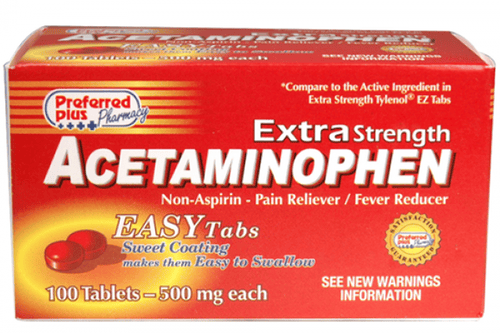
Bệnh nhân viêm phế quản khi có biểu hiện sốt được chỉ định dùng acetaminophen
3. Measures to prevent bronchitis
3.1. Note for those who are not sick
Isolation of sick people, do not let patients have close contact with people with symptoms of acute respiratory infection, should wash hands often with soap, cough training (cough into a towel or cover your mouth when coughing); Cleaning of surfaces: Bacteria are attached to the surface of the floor, clothes, furniture, toys, etc., so it should be cleaned regularly; Drink enough water and stay warm in winter; Supplementing essential micronutrients: When supplementing with zinc and vitamin C is required, a doctor's guidance is required; Increase nutrients: Eat a variety of food groups, get vaccinated against diseases.

Uống đủ nước giúp ngăn ngừa viêm phế quản
3.1. Note to patients for effective treatment
Quit smoking, keep the neck area warm in the cold season and avoid places with a lot of dust; Should regularly clean the nose and throat with physiological saline solution or dilute salt water to gargle daily; Gentle exercise, early morning exercise to breathe fresh air; Eat a nutritious diet, supplement with vegetables and fruits rich in vitamins and minerals to improve the body's immune system; Proper rest and relaxation of the mind; Drink enough water, at least 2 liters of water / day to purify the body. Use of antibiotics in the treatment of bronchitis must strictly follow the doctor's prescription. This helps ensure effective treatment and reduces the risk of side effects.
Currently, the use of antibiotics, indiscriminate use of antibiotics has increased the risk of side effects and becoming antibiotic resistance. Therefore, patients should choose reputable medical facilities with good expertise to treat and guide the most effective use of antibiotics.
Vinmec International General Hospital is the address for examination, treatment and prevention of diseases. When performing the examination process at Vinmec, customers will be welcomed and used the modern facilities and machinery system along with perfect medical services under the guidance and advice of the doctors. Good doctors, well-trained both at home and abroad.
In case it is necessary to use antibiotics to treat respiratory diseases such as acute bronchitis, doctors at Vinmec will provide a treatment plan, and advise and guide patients to use effective drugs. effective, avoid the abuse, indiscriminate use of antibiotics that cause unwanted side effects such as antibiotic resistance.
Please dial HOTLINE for more information or register for an appointment HERE. Download MyVinmec app to make appointments faster and to manage your bookings easily.




